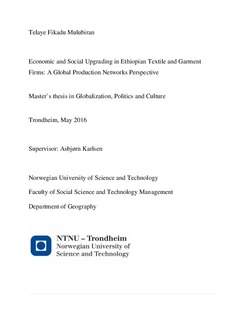| dc.description.abstract | The insertions of developing countries into global economy have ensued a new challenges and opportunities to their firms and workers. The issue of social upgrading in general, and the link between economic and social upgrading in particular is not thoroughly explored despite recently emerging literatures. This study aimed to contribute to the growing literatures in the field through examining the link between economic and social upgrading, and the conditions under which social upgrading is achieved in the context of global production networks. It examined five textile and garment firms in Ethiopia through employing qualitative research approach and case study research strategy with semi-structured interview and focus group discussion being the major data collection instruments. The data was collected from government offices, employers association, trade unions, supplier firm managers, and workers which enabled to capture the perspective of different stakeholders about the issue under investigation, and ensure the validity and reliability of the study.
This study showed that the link between economic and social upgrading is not linear as assumed by neoclassical economic theory. It has identified different institutional conditions mediating the successful transformation of economic upgrading into social upgrading. The contradictory commercial requirements of global buyers for fast delivery time and lower price, and their simultaneous demand for quality products have contributed to casualization of employment, increased work intensity and overtime work, and squeezed the wage rate of workers preventing social upgrading outcomes. Besides, the position of firms and workers within global production networks where entry barrier is lower and competition is higher has also averted the social upgrading opportunity of workers for skills training and wage increment as such position requires less skilled labor force and involves intense price based competition. The social and institutional embeddedness of supplier firms and conditions internal to the operation of firms (such as machinery dysfunctionality, workers absenteeism, and electric power interruption) have also lead to increased work intensity, compulsory overtime work, and casualization of employment.
This study also showed the central role of labor unions, and national labor regulatory frameworks in facilitating the social upgrading of workers provided that certain institutional conditions are meet. Hence, economic upgrading does not guarantee social upgrading as claimed by neoclassical economic theory. Rather, it depends on a wide variety of institutional factors involving the interplay between capital, state, and labor as argued by the institutionalist perspective. | nb_NO |
